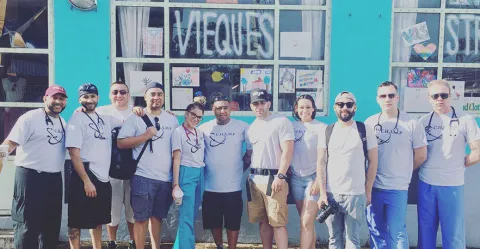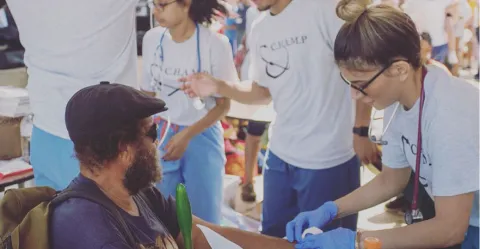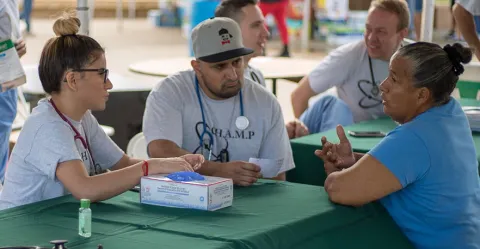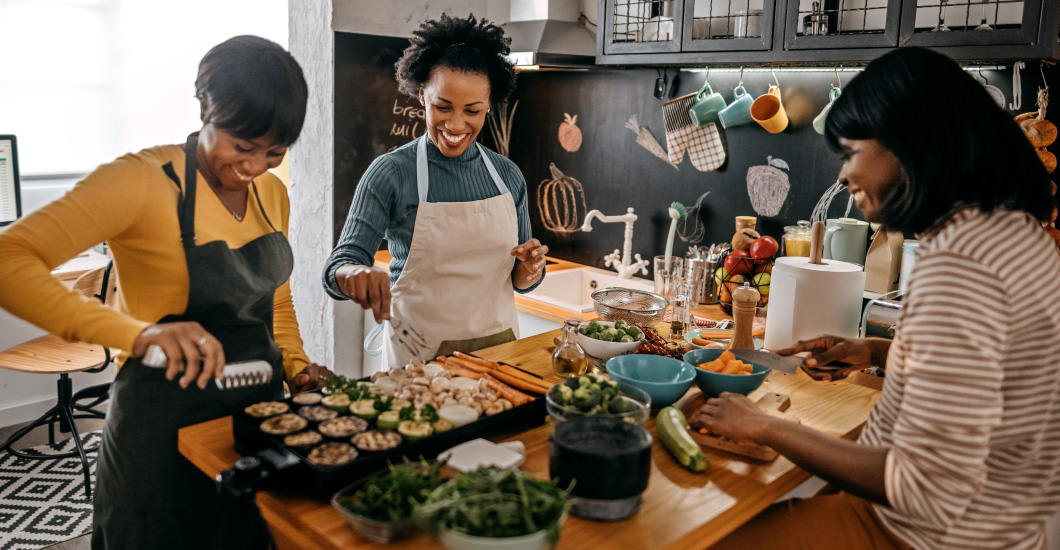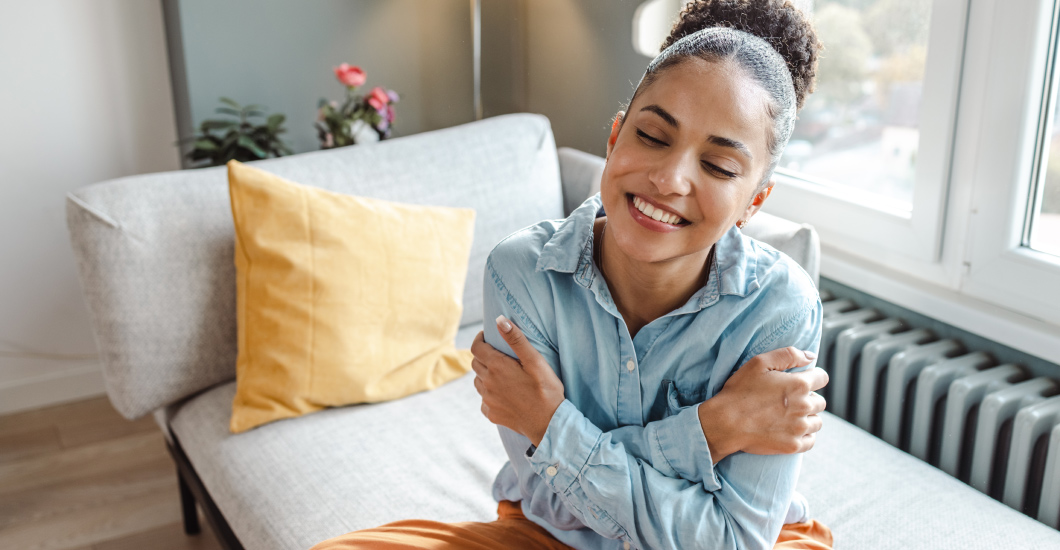Sanitas Medical Center nurse practitioner travels to Puerto Rico, to assist in relief efforts
Sanitas news /
Katherine Reina, ARNP is one of our medical professionals, located at our Bridgeport, Connecticut location. American University of Antigua’s Dr. Bilal Khan, as well as the university's Dr. Pedro Torres, lead a medical team into Vieques, Puerto Rico, to assist in the aid of victims of Hurricane Maria, to which Katherine was a part of. As we know so many who are were and are affected by this devastating hurricane, we wanted to get more insight into not only Katherine’s experience, but also what lead her into the world of healthcare. Here is her story.
1. How did you get started in the healthcare field?
Growing up I was always exposed to health care. My grandmother was diagnosed with liver disease when I was very young and under her care. My mother was also a Pre-Med student during this time in NYC. I moved to NYC at age 9 shortly after my grandmother received a life saving liver transplant. This required many follow up appointments in which my grandmother who was Spanish speaking, only required translation so that I often accompanied her to her appointments to help. I honestly never expected to be a health care provider it kind of always called on me. When I was in high school I had the opportunity to take a certified nurse assistant course and fell in love with patient care. I decided to pursue a career in nursing at the age of 17 and by 21, I was a bachelor's prepared registered nurse in the medical ICU at the St Raphael's campus of Yale New Haven. After two years of MICU experience, I decided to gain experience with surgical and trauma patients and transferred to SICU at Yale New Haven where I worked for 5.5 years until earning my doctorate in nursing practice and joining the Sanitas family.
2. Did your background with where you came from also influence your career path?
I feel that nursing always called on me even at a young age I felt a sense of purpose in being caring and helping out with my grandmother. At a young age, I realized that there was a great need for bilingual providers in the health care field. Later as an ICU nurse I experienced first hand the difference that cultural competence and language proficiency made in patient outcomes. I think in a way my background has definitely shaped my career field.
3. As you’re aware, due to Hurricane Maria, PR was devastated. I am aware that due to the terrible natural disaster, Sanitas has given free services to displaced families from Puerto Rico. Can you share any specific stories of people you or Sanitas has helped so far in Connecticut?
Having Puerto Rican roots and most of my family still on the island, this natural disaster has definitely hit close to home. As soon as I learned of the severity of Maria I knew we needed to help and urged our human resources specialist as well as operations manager so that we could do something as a leading Latin American health care organization. I have personally provided free exams and consultations to several patients through our Sanitas Medical Center initiative for displaced families. One of these individuals was an elderly female who needed refills on her medications. Not only were we able to do this for her but also helped her sign up for Medicare, so that she could continue getting the medical care she desperately needed. We have provided vaccinations and education regarding their medical conditions which they were not previously aware of. It has been a very successful initiative that has allowed us to provide free high quality medical services and make necessary connections for these individuals within the community to strengthen their access to health care.
4. American University of Antigua’s Dr. Bilal Khan, as well as the university's Dr. Pedro Torres, lead a medical team into Vieques, Puerto Rico, to assist in the aid of victims of Hurricane Maria, which you were a part of. Can you share a little bit about of what you did?
I met Dr. Khan, a critical care pulmonologist (attending at Norwalk hospital) several years ago in the SICU at Yale. When we learned about Maria we re-connected via a social media post in which he had inquired about medical professionals who'd be willing to travel to Puerto Rico and aide in a medical camp volunteer effort. Dr. Torres is an Emergency medicine resident in Ponce, Puerto Rico who met Dr. Khan via their ties to the University of Antigua. Dr. Torres also organized CHAMP (Community Health Alliance of Medical Professionals), a volunteer based organization to help meet the needs of the medical mission he envisioned. Dr. Torres and Dr. Khan were able to recruit over 20 health care professionals (Physicians, nurses, paramedics, EMTs, social workers and administrators). I believe I was the only nurse practitioner in our group. We all arrived on a Friday morning and quickly traveled to Vieques to begin our home visits of patients that were identified as high need. We broke up into groups and visited areas that were still in complete levels of devastation. This for me was particularly difficult. Vieques is still under a great deal of destruction with many homes being completely deteriorated and others with high infestation of molds and post hurricane debris. I couldn't accept that even months after Maria this area was in complete chaos with almost non existent access to health care. Many of the Vieques residents have lost their homes, their jobs, and access to health care, because most medical services are only offered in the mainland.
Dr. Torres had made connections with local community leaders and a local organization "A la mano por Puerto Rico"- also led by a Puerto Rico doctor. The community leaders realized that CHAMP, A la mano por Puerto Rico, and J.J. Barrea's organization were hosting different events on the same Saturday in Vieques so that they decided to close off the main plaza and connected us all so that community members were able to easily locate the services. The event itself had a turnout of around 1500 people. We had set up a triage area with a mini pharmacy and urgent care area. We dispensed refills on medications and supplies (which so many were out of for months), thanks to the generous donations we received through a gofundme page. Some patients required rehydration therapy and I was directly involved with managing these patients who required additional care and IV fluids.
For me, this was one of the most humbling experiences I have had the opportunity to be a part of. Despite the tremendous level of loss and disaster, the one thing that stood out most to me was the resilience of the Puerto Rican community. I feel our team was amazing all around and we were all there living every second our purpose as health care providers. We were all reminded of why it is we go into health care and how the calling goes far beyond the hospital or clinic-it is about the humanity that drives our profession. Our presence in a way delivered a message of hope to the people of Vieques, that their prayers are being heard.
5. What did you learn from that experience?
I learned a great deal about being resourceful when we didn't have certain supplies or items for care – that’s for sure! There’s still so much work that needs to be done and a tremendous level of need in Puerto Rico. I also learned about the resilience of the Puerto Rican people and strength of the Vieques community. Despite the constant bad situations on the news, there are still a lot of good people out there and a lot of heart left in humanity, at least that's what I saw during this trip. I also had a divine reinforcement in knowing that no matter what the challenge we are facing may be there is always something that can be done, and that ultimately how we choose to respond defines our outcomes. I personally fell in love with the art of nursing all over again and it was through the charity work in Vieques that I knew why nursing called on me almost 15 years ago.
6. Do you know personally of any ways how people can help victims of Hurricane Maria?
CHAMP is currently planning another trip in the near future and we will be hosting a similar medical camp in a different area of the island. I will be joining this second trip which will be a bit longer than our first. Just like our first trip, all of the volunteers will pay their flights and accommodations so that we can use any of the funds we raise towards medical supplies. Any level of support goes a long way at this time whether it is donating goods or reaching out to local policy makers and urging assistance for the Puerto Rican people. People have lost their homes, businesses, churches, and health care access but we can all do something to help rebuild Puerto Rico. Some foundations which I personally learned are putting 100% into the community include:
- A la mano por Puerto Rico
- J.J Barea's Relief organization
- Ricky Martin Foundation
